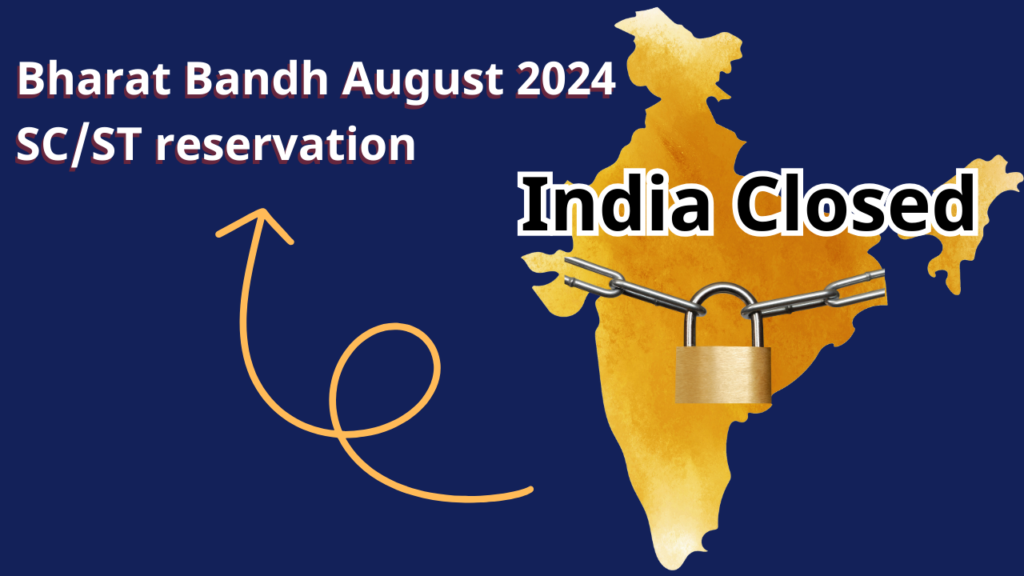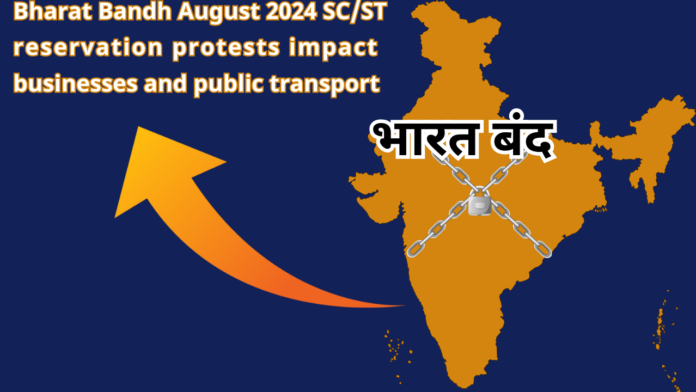Bharat Bandh August 2024: The Bharat Bandh on August 4, 2024 was organised in response to the recent Supreme Court decision regarding the exclusion of the “creamy layer” from Scheduled Caste (SC) and Scheduled Tribe (ST) reservations. The verdict has sparked controversy, especially among Dalit and Adivasi groups who fear it could reduce the effectiveness of reservations aimed at uplifting these communities.
Bharat Bandh August 2024: The bandh was called by the Aarakshan Bachao Sangharsh Samiti and received significant political support from various parties including the Congress, Rashtriya Janata Dal (RJD), Bahujan Samaj Party (BSP) and others. The protests led to disruptions in public transport, with trains and buses affected in several states and many shops and markets remaining closed. However, essential services such as hospitals and emergency services remained operational.
Bharat Bandh August 2024: The protests remained largely peaceful, with security beefed up in states such as Rajasthan and Uttar Pradesh, where the bandh had a profound impact.
For more detailed coverage, you can check out the sources here and here.
Why is Bharat Bandh August 2024 happening?
The Bharat Bandh on August 21, 2024 was organized to protest the recent Supreme Court ruling regarding reservations for Scheduled Castes (SC) and Scheduled Tribes (ST). The Court’s ruling, issued on August 1, 2024, allows states to create sub-categories within these communities, with the aim of ensuring that reservation benefits are delivered more effectively to those most in need. However, the move has sparked significant controversy, particularly among Dalit and Adivasi groups, who fear it could lead to further marginalization and weaken the overall reservation system.
Bharat Bandh August 2024: The bandh was called by the Aarakshan Bachao Sangharsh Samiti and received widespread support from various political parties and social organizations. The protest was aimed at pressuring the government to reverse the Supreme Court’s decision. In response, there were significant disruptions in public transport and commercial activity, especially in areas such as Rajasthan and western Uttar Pradesh, while essential services such as hospitals and pharmacies remained operational(Study IQ Education Business Today Share Market News).
SC/ST reservation protests affect businesses and public transport
Bharat Bandh August 2024: The Bharat Bandh on August 21, 2024 in India was a significant event that underscored the ongoing tensions and debates over the reservation system for Scheduled Castes (SCs) and Scheduled Tribes (STs). The protests, triggered by a recent Supreme Court ruling, had a cascading effect, affecting both businesses and public transport across various states, especially in regions such as Rajasthan and western Uttar Pradesh. Following is a detailed analysis of the impact of these protests on businesses, public transport, and the broader social and political implications.
1. Background of the protests
Bharat Bandh August 2024: The immediate trigger for the Bharat Bandh was the Supreme Court ruling on August 1, 2024, which allowed states to create sub-categories within SC/ST communities. The decision was aimed at ensuring that the benefits of reservation reached those most in need, especially those who have been historically marginalized within these groups. However, the verdict also introduced the concept of excluding the “creamy layer” within SC/ST communities from reservation benefits, a move that faced considerable opposition. Critics argued that this would reduce the effectiveness of the reservation system and further marginalise already disadvantaged sections within these communities(Study IQ Education Business Today).
2. Call for Bharat Bandh
Bharat Bandh August 2024: In response to the verdict, the Aarakshan Bachao Sangharsh Samiti called for a nationwide Bharat Bandh on August 21, 2024. The bandh received widespread support from various political parties and social organisations, including the Jharkhand Mukti Morcha (JMM), Congress, Rashtriya Janata Dal (RJD), Bahujan Samaj Party (BSP), Samajwadi Party (SP) and several leftist parties. The protests were particularly intense in states like Rajasthan and western Uttar Pradesh, where SC/ST groups have a significant presence(Study IQ Education Share Market News).

3. Impact on businesses
Bharat Bandh August 2024: The Bharat Bandh had a profound impact on businesses in the affected areas. Shops and markets remained closed in several cities and towns due to the protests. In Rajasthan, for instance, major business centres witnessed a near-complete shutdown, with traders and shopkeepers choosing to keep their establishments shut either in support of the shutdown or out of fear of potential violence and unrest.
a. Economic losses
Bharat Bandh August 2024: The closure of businesses during the shutdown led to significant economic losses. Small and medium enterprises in particular suffered heavy losses, as they are heavily dependent on daily transactions for their income. According to estimates, the losses ran into several crores of rupees, with sectors such as retail, wholesale and small manufacturing units being the worst hit. The hospitality industry also suffered, with hotels and restaurants reporting a sharp drop in business due to reduced movement of people and a general atmosphere of uncertainty.
b. Supply chain disruptions
Bharat Bandh August 2024: The shutdown also caused disruptions in supply chains, especially for perishable goods. With transport services disrupted, the movement of goods was severely affected, leading to shortages in some sectors. This was particularly evident in the agricultural sector, where the movement of fresh produce to markets was disrupted, resulting in losses for both farmers and traders.
4. Impact on public transport
Bharat Bandh August 2024: Public transport was another major sector that was significantly affected by the Bharat Bandh. In many areas, buses and trains were either cancelled or ran with limited services due to the protests. Fearing violence and road blockages, many transport operators suspended services, especially in areas such as western Uttar Pradesh and Rajasthan.
a. Disruption in bus services
Bharat Bandh August 2024: State-run bus services were the worst affected, where many routes were cancelled or diverted to avoid areas that were prone to protests. In cities such as Jaipur and Aligarh, most bus services were suspended for the day, leaving passengers stranded. The lack of bus services also had a massive impact on daily wage earners, who depend on public transport to reach their workplaces.
b. Impact on train services
Bharat Bandh August 2024: Train services were also disrupted, especially in areas with a high SC/ST population. In some areas, protesters blocked railway tracks, causing delays and cancellations of several trains. This affected not only daily commuters but also long-distance travellers. Anticipating the shutdown, the railways had already taken precautions by deploying additional security personnel and rerouting some trains to avoid conflict zones.
C. Impact on Urban Transport
In urban areas, the impact on transport was felt in the form of a reduction in the availability of taxis and auto-rickshaws. Many drivers chose to stay off the roads either in support of the shutdown or out of concern for their own safety.
FAQS
Here are some frequently asked questions (FAQs) about the Bharat Bandh on August 21, 2024 and its impact on businesses and public transport:
1. What was the reason behind the Bharat Bandh on August 21, 2024?
The Bharat Bandh was called to protest the Supreme Court’s decision on SC/ST reservations, which allowed states to create sub-categories within these communities and introduced the concept of excluding the “creamy layer” from reservation benefits. The decision drew strong opposition from SC/ST groups who felt it would weaken the reservation system and further marginalise disadvantaged sections within these communities(Study IQ Education Business Today).
2. Who organised the Bharat Bandh?
The Bharat Bandh was organised by the Aarakshan Bachao Sangharsh Samiti, with support from various political parties such as the Jharkhand Mukti Morcha (JMM), Congress, Rashtriya Janata Dal (RJD), Bahujan Samaj Party (BSP), Samajwadi Party (SP) and several left parties.
3. Which states were most affected by the Bharat Bandh?
The states most affected by the Bharat Bandh were Rajasthan and parts of western Uttar Pradesh, which have a significant SC/ST population. These areas saw widespread participation in the protests, leading to significant disruptions in businesses and public transport.
4. How did the Bharat Bandh affect businesses?
The bandh led to the closure of many businesses, especially small and medium enterprises, in the affected areas. Major commercial centres saw an almost complete shutdown, leading to significant economic losses. Supply chains were also disrupted, especially for perishable goods, leading to shortages in some areas.
5. What was the impact of the Bharat Bandh on public transport?
Public transport was severely affected during the Bharat Bandh. State-run bus services remained largely suspended, and many train services were cancelled or delayed as protesters blocked railway tracks. Urban transport was also disrupted, with availability of taxis and auto-rickshaws reduced, leaving commuters stranded(Share Market News).
6. Were there any incidents of violence during the Bharat Bandh?
Though there were some incidents of violence and clashes between protesters and police, the shutdown remained largely peaceful. Law enforcement agencies were on high alert, especially in sensitive areas, and took precautionary measures to prevent widespread violence(Business Today).
7. What was open during the Bharat Bandh?
Essential services such as hospitals, pharmacies and emergency services remained operational during the Bharat Bandh. However, most businesses, schools and government offices either remained closed or operated at reduced capacity due to the disruptions(Share Market News).
8. What were the broader social and political implications of the Bharat Bandh?
The Bharat Bandh highlighted deep social and political tensions in India over the issue of reservation. It also underscored the importance of reservation as a political issue, especially for parties that receive significant support from SC/ST communities. The protests drew attention to the need for a more inclusive approach to policymaking that considers the diverse needs of all segments of society(Share Market News).
9. How did the media cover the Bharat Bandh?
Media coverage of the Bharat Bandh varied, with some outlets focusing on the disruptions caused by the bandh, while others highlighted underlying issues of social justice and the concerns of SC/ST communities. This reflects the broad divisions in Indian society over the issue of reservation(Business Today).
10. What measures did law enforcement take to manage the Bharat Bandh?
Law enforcement agencies deployed additional personnel in sensitive areas, imposed Section 144 in some areas to prevent large crowds, and held meetings with local leaders and market associations to ensure cooperation. These measures helped maintain public safety and prevent widespread violence during the bandh.(Share Market News).



[…] Kerala Blasters FC 2024 match schedule promises an exciting season for fans of the Indian Super League (ISL) team. As the club […]
[…] Introduction : Telegram Ban in India: […]
Can you be more specific about the content of your article? After reading it, I still have some doubts. Hope you can help me.